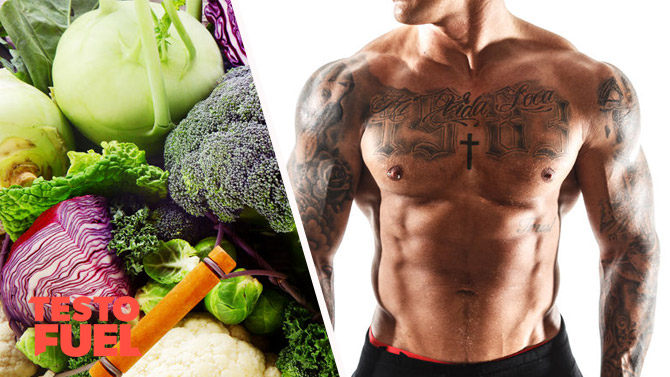TestoFuel Blog : Make Gains & Pack on the Muscle

Testosterone is an important contributor to overall health in men, and when levels are optimized it promotes physical characteristics of masculinity, health and maleness.
Exercise and good nutrition are key in making sure that your T levels are as high as they can be, and this can be further promoted with the use of supplements.
In this article we will discuss Diindolymethane – a product reported in many media outlets as being the next ‘miracle’ supplement.
In this article we’ll break down the research to tell you if DIM is a safe and effective option for your physical well-being and T levels. This is what we’ll cover:
Diindolymethane, otherwise known as DIM, is simply named after its chemical structure – it is made up of methane and two indoles.
When you eat cruciferous vegetables from the brassica family, such as broccoli, red cabbage and cauliflower, your body produces a type of organic phytochemical compound called indole-3-carbinol (I3C). This is a particularly important compound because research suggests that an indole-rich diet can decrease the risk of a variety of cancers [1].
Diindolymethane is a naturally-occurring, organic compound that is made when I3C breaks down during digestion. What this means is that the accumulation of Diindolymethane – which is more bioactive to cells – then becomes a valuable compound in the fight against cancer as well.
It is claimed that Diindolymethane can boost metabolism and balance hormones in favor of testosterone production. But what does the research say? Read on to find out…
Key Point: Diindolymethane is produced naturally in the body through the digestion of cruciferous vegetables.
Although DIM and indeed I3C have been shown to have anti-carcinogenic properties, the research into T boosting effects is somewhat inconclusive.
There are some promising studies that show DIM can reduce estrogen levels. That’s good for men, as high estrogen levels can make testosterone plummet. The potential action though is quite complex…
Dim hasn’t been shown to increase T levels directly, but it has been shown to prevent free testosterone from being swallowed up by sex-hormone binding globulin (SHBG) – a protein that ‘locks up’ testosterone, decreasing its bioavailablity.
So basically, if “free T” isn’t bound to SHBG it is available for use by the body. The more you have, the better – there’s more available to saturate your muscles.
This was illustrated in a study published in Thyroid [2], in which Diindolymethane was found to alter the metabolism of estrogen – a potent female hormone – in a way that made it inhibit SHBG.
So there’s some moderate evidence that this supplement may be beneficial to you. But before you consider using it you need to be aware of the side effects.
Key Point: DIM does not directly boost testosterone but may have some anti-estrogenic benefits.
Eating cruciferous vegetables is unarguably good for health – remember, that I3C and DIM content reduces cancer risk. But that doesn’t mean that more is better, or that large doses in supplement form is safe.
Although currently considered non-toxic, less-serious side effects are quite common. In a study published in the British Journal of Cancer [3], 69% of women receiving DIM for risk of low grade cervical cancer reported side effects.
The ingestion of 150mg of Diindolymethane per day for a 6-month period found that 31% of the women volunteers reported that their urine had changed color, and a significant number reported weight gain. Additional side effects reported included headaches (17%), changes to menstrual cycle (13%) and increased bowel movements (25%) amongst many others.
Out of a sample of over 300 women, 10 reported serious side effects.
Additionally, high doses of 600mg are unsafe and have been associated with the development of hyponatremia – a serious condition where sodium levels in the blood drop to dangerously low levels [4].
Diindolymethane is named after its chemical structure – it is made up of methane and two indoles.
It is found in cruciferous vegetables such as broccoli, red cabbage and cauliflower. Diindolymethane is a metabolite of a type of organic phytochemical compound called indole-3-carbinol (I3C) and research suggests that an indole-rich diet can decrease the risk of a variety of cancers and decrease excess estrogen levels.
It is claimed that this compound can boost metabolism and balance hormones in favor of testosterone production. It does so by increasing the amount of free, available testosterone by preventing the protein ‘sex-hormone binding globulin’ – from locking up T. The evidence at this stage is somewhat limited though.
Much of the current research into the hormone regulating effects of cruciferous vegetable compounds uses I3C not DIM as a test compound – it is only one of a few active compounds of I3C.
For that reason the evidence on isolated Diindolymethane is less clear, At this stage, regular consumption of broccoli and cauliflower would be more beneficial until clearer research becomes available.
Yes there is.
When it comes to improving testosterone levels safely and effectively you need to go for ingredients that are proven to work.
As a top-of-its-game supplement, TestoFuel contains only ingredients that have been shown to work in the most rigorous studies. Including active ingredients such as oyster extract and magnesium this is the best product you can choose.
This supplement has the ability to support:
TestoFuel is ideal for improving your performance both in and out of the gym, and helping you attain that all-important muscular physique.